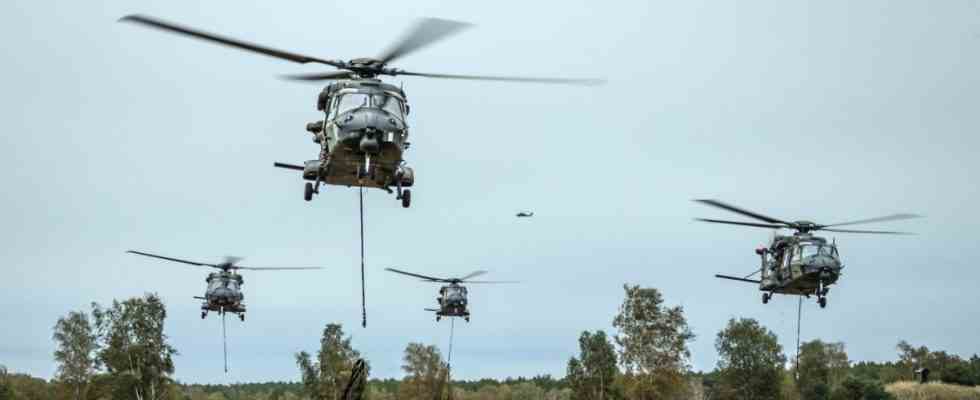The Parliamentary Commissioner for the Armed Forces, Eva Högl, clearly criticizes the slow implementation of the turning point policy for the Bundeswehr. Despite an “epochal upheaval” triggered by Russia’s attack on Ukraine and an additional 100 billion euros in the form of a special fund for the modernization of the troops, far too little has happened in 2022. “It is significant that no euro was spent from the special fund by the end of the reporting year,” writes Högl in her military report for 2022, which was published on Tuesday.
Högl explains that since the announcement of the special fund, the servicewomen and men have expressed enormous expectations on almost all of their visits to the troops. When it comes to equipment, the situation must improve quickly. The military commissioner warned against disappointing these expectations. In her opinion, it is also important “to use the momentum of the high level of social support to improve equipment and facilities”.
Only, the statement that has been true for years for the Bundeswehr: “It’s all taking far too long”, according to Högl, has “unfortunately been confirmed” also with regard to the special fund. Addressing Defense Minister Boris Pistorius (SPD), who only took over the leadership of the department from unsuccessful party colleague Christine Lambrecht in January, she said: “The reform of the procurement processes that has been initiated must be accelerated at full speed.”
The Commissioner for the Armed Forces, appointed by the Bundestag in a secret ballot, monitors the state of the Bundeswehr. At the same time, Högl is the contact person for the concerns of the soldiers and is therefore also regarded as their “lawyer”. Högl is a member of the SPD. As a military commissioner, she is supposed to act non-partisan.
Her report again lists blatant cases in which soldiers have been waiting for promised material for more than ten years. For example, the procurement of new aviator helmets for helicopter pilots goes back to 2013. The US armed forces have been using such helmets since the 1990s and they are available on the market.
Högl asked the ministry why procurement was taking so long. It was explained to her that the army, air force and navy first had to agree on what requirements they had for new helmets, then it turned out that aviation approvals were necessary. The new helmets are to be delivered to the crews from the summer of 2023.
Högl suggests “at least temporarily – until changes are implemented – to do without the existing set of rules in part”. If it were up to her, the Bundeswehr should provide information on the status of orders, expenditure and purchases from the special fund in a “constantly updated report”. This could ensure more transparency and increase the pressure to quickly equip the Bundeswehr better.
The defense budget must grow “constantly and in significant steps”.
The military commissioner repeated her call for additional billions. According to Högl, the 100 billion euros from the special fund are not enough to modernize the Bundeswehr. She shares the assessment of military experts, according to which the troops need a total of 300 billion euros. Therefore, the regular defense budget must be increased “constantly and in significant steps”.
The demand falls amid the budget deliberations of the federal government. Defense Minister Pistorius demands an additional ten billion euros a year. In view of the limited funds, however, there is a heated argument in the traffic light alliance as to where priorities should be set.
In its annual report, Högl also draws attention to the increased burden on soldiers. Since the start of the Russian war of aggression, the Bundeswehr has significantly increased its presence on NATO’s eastern flank. From 2025 onwards, with at least 30,000 soldiers, twice as many women and men will have to be on stand-by for NATO as today, and then on a permanent basis. In view of “limited resources”, the new tasks in national and alliance defense would inevitably reduce the Bundeswehr’s scope to be deployed in conflicts on other continents. The military commissioner Högl cites the example of the navy, which has suffered greatly from the austerity measures of the past few decades and is demanding priorities.
Högl is concerned that the Bundeswehr is not growing in terms of personnel as intended in view of the new tasks. At the end of the year, 183,051 soldiers were serving in the Bundeswehr, a slight decrease compared to the previous year. The force is expected to grow to 203,000 women and men by 2031.
The number of applicants has also fallen, by eleven percent. Of the temporary soldiers who began their service in the Bundeswehr from January to May 2022, 27 percent would have resigned within the first six months of the probationary period, and in the army it was almost 33 percent. “The Bundeswehr must once again massively step up its efforts to recruit personnel,” demands Högl. At the end of 2022, almost 19,000 positions remained vacant in the careers above the team ranks – almost 16 percent.
The military commissioner is alarmed by the increased number of reports of sexual assaults. In 2022, 357 violations of sexual self-determination were reported to her office, compared to 303 in the previous year. That is more than before the corona pandemic, when soldiers met significantly less.
An internal Bundeswehr investigation found that 80 percent of those affected were women, and alcohol was involved in a third of the cases. “That’s unacceptable,” said Högl. She called on the superiors to intervene more consistently and to punish such cases more severely. Right-wing extremism remains a problem that the Bundeswehr must actively counteract. However, the number of reported cases fell slightly during the reporting period. “The zero-tolerance policy that has been pursued for years is correct,” says Högl.

